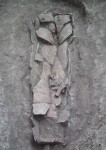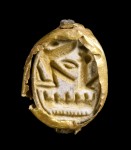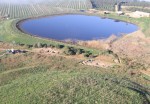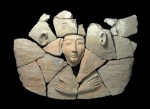 Archaeologists excavating a site near Tel Shadud in Israel’s Jezreel Valley before a natural gas pipeline is installed in the area have unearthed a rare anthropoid clay coffin from the reign of Pharaoh Seti I (1290 B.C. to 1279 B.C.). The cylindrical coffin has a serene face sculpted in the lid, with hands crossed on his chest. Only a few similar coffins have been found before in Israel, that last of which was discovered 50 years ago.
Archaeologists excavating a site near Tel Shadud in Israel’s Jezreel Valley before a natural gas pipeline is installed in the area have unearthed a rare anthropoid clay coffin from the reign of Pharaoh Seti I (1290 B.C. to 1279 B.C.). The cylindrical coffin has a serene face sculpted in the lid, with hands crossed on his chest. Only a few similar coffins have been found before in Israel, that last of which was discovered 50 years ago.
 The coffin was interred with pottery food storage vessels, a bronze dagger and bowl and animal bones. These could have been offerings to the gods and the means to provide nourishment for the deceased on his voyage to the afterworld. There was a skeleton of an adult male inside the coffin. Because the pottery was locally made, archaeologists think he was probably a local man working for the Egyptians, he could well have been Egyptian. Either way, the fact that he was buried with an Egyptian scarab seal encased in gold and bearing the name of Seti I suggests that he was of very high rank. The coffin itself confirms that, since it would have been an extremely expensive piece affordable only to the elite.
The coffin was interred with pottery food storage vessels, a bronze dagger and bowl and animal bones. These could have been offerings to the gods and the means to provide nourishment for the deceased on his voyage to the afterworld. There was a skeleton of an adult male inside the coffin. Because the pottery was locally made, archaeologists think he was probably a local man working for the Egyptians, he could well have been Egyptian. Either way, the fact that he was buried with an Egyptian scarab seal encased in gold and bearing the name of Seti I suggests that he was of very high rank. The coffin itself confirms that, since it would have been an extremely expensive piece affordable only to the elite.
Egyptian control of Canaan had been waning since the 14th century B.C. thanks to the rising Middle Assyrian Empire. The process had accelerated in the declining days of the Eighteenth Dynasty when the social and political chaos brought on by Akhenaten’s attempted religious reformation made maintaining its empire the least of Egypt’s problems. Ramesses I, founder of the Nineteenth Dynasty, and his son Seti I sought to return order to the country and reclaim some of its lost territories.
 Seti wasted no time, taking his army into Canaan starting the first year of his reign. He took advantage of nomadic incursions and infighting between the Canaanite city-states and “marched against them like a fierce-eyed lion, making them carcasses in their valleys, overturned in their blood like those that exist not. Everyone that escapes his fingers says: ‘His might toward distant countries is the might of his father Amun, who hath assigned to him a victorious valor in the countries’.” That vivid description is from the North Wall of the Great Hypostyle Hall at Karnak which, along with two stele unearthed at Beth She’an, a city in the Jezreel Valley about 25 miles southeast of Tel Shadud, is the main source of information about Seti I’s military campaigns.
Seti wasted no time, taking his army into Canaan starting the first year of his reign. He took advantage of nomadic incursions and infighting between the Canaanite city-states and “marched against them like a fierce-eyed lion, making them carcasses in their valleys, overturned in their blood like those that exist not. Everyone that escapes his fingers says: ‘His might toward distant countries is the might of his father Amun, who hath assigned to him a victorious valor in the countries’.” That vivid description is from the North Wall of the Great Hypostyle Hall at Karnak which, along with two stele unearthed at Beth She’an, a city in the Jezreel Valley about 25 miles southeast of Tel Shadud, is the main source of information about Seti I’s military campaigns.
 The victorious army established fortifications at watering holes on the way back to Egypt. Beth She’an was rebuilt according to a new city plan and became an important administrative center. Its population was primarily Egyptian government and military officials and a number of artifacts imported from Egypt have been discovered there. The locally produced artifacts, mainly pottery, were made in traditional Canaanite forms or in imitation of Egyptian styles.
The victorious army established fortifications at watering holes on the way back to Egypt. Beth She’an was rebuilt according to a new city plan and became an important administrative center. Its population was primarily Egyptian government and military officials and a number of artifacts imported from Egypt have been discovered there. The locally produced artifacts, mainly pottery, were made in traditional Canaanite forms or in imitation of Egyptian styles.
 Archaeologists may attempt to extract DNA from the skeletal remains to determine whether the man in the expensive coffin was a local or an Egyptian, but that’s a long shot. Four other graves were found in the small 16-foot square trench, two containing the remains of men and two of women. It’s possible they are all family members. It’s also possible the area is the site of a much larger cemetery, like the one at Beth She’an.
Archaeologists may attempt to extract DNA from the skeletal remains to determine whether the man in the expensive coffin was a local or an Egyptian, but that’s a long shot. Four other graves were found in the small 16-foot square trench, two containing the remains of men and two of women. It’s possible they are all family members. It’s also possible the area is the site of a much larger cemetery, like the one at Beth She’an.
This was just a salvage excavation, however, to unearth any archaeological remains in the path of the gas pipeline. There is no current project to expand the dig.
What strange, huge thumbs the effigy has!
The better to hitchhike my way to the afterlife, my dear!
The face appears to be a death mask, do not know if that avenue has been explored. Not many clay coffins have been unearthed in Egypt, although a very intriguing clay mask was unearthed some years ago at Abydos, southern Egypt, in the Elite Cemetary (c 3600 BCA)and it is very spectacular.
See this link about the find – great pix –
file:///C:/Users/guests/Documents/deT%20%20=%20PLSE.%20SAVE/Nekhen%20News%20B%20Adams%20nn-11-1999.pdf